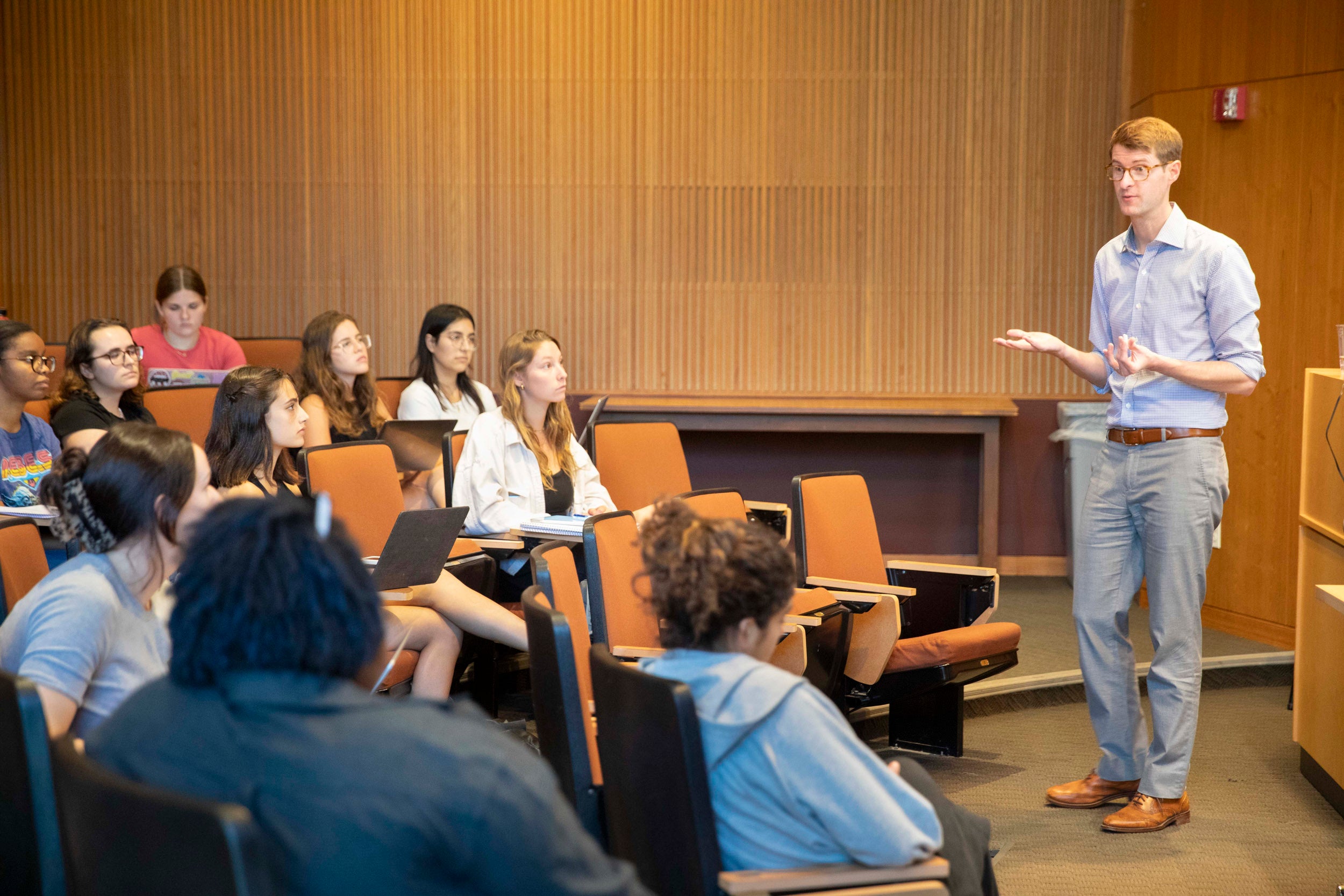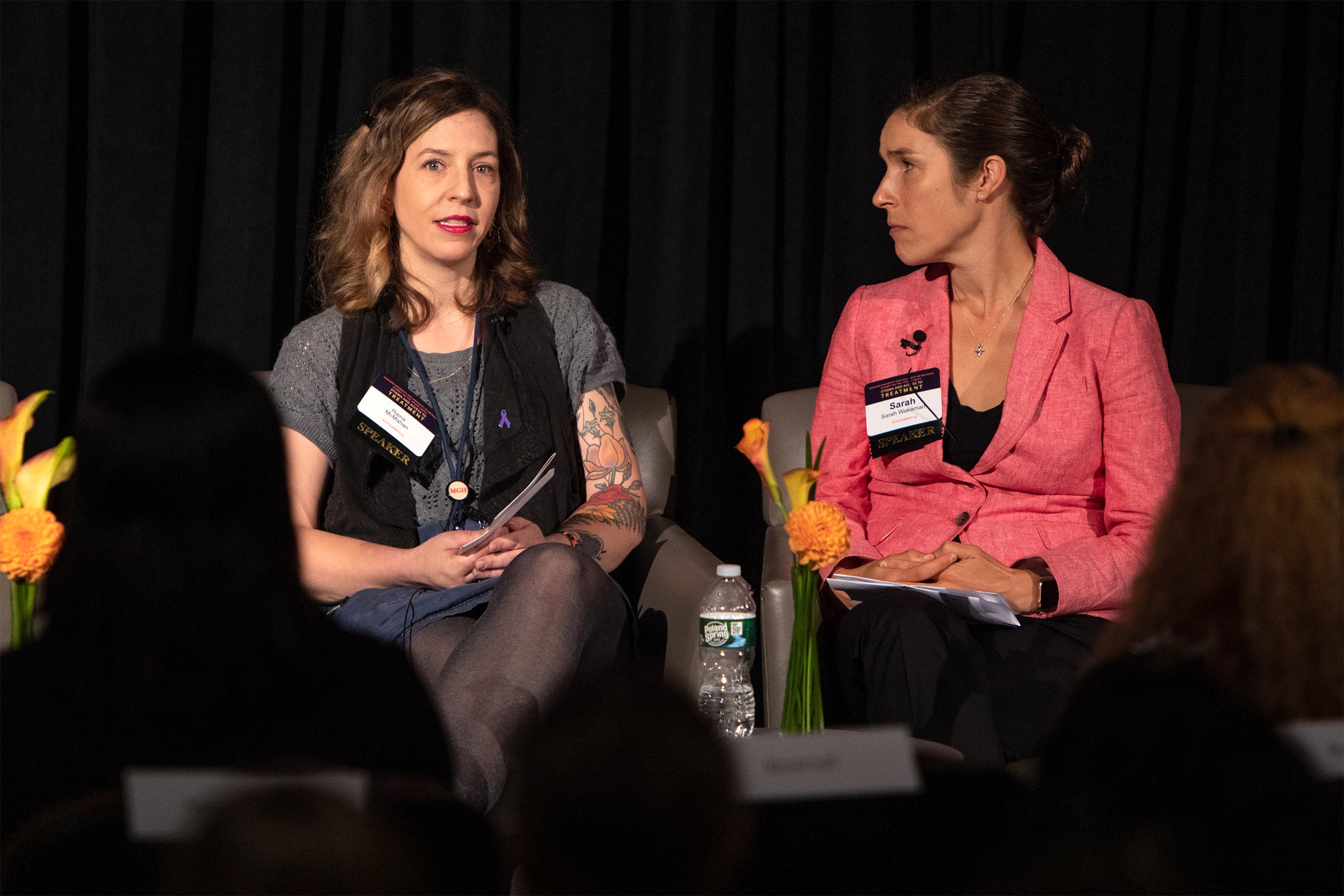
Professor of Psychology Mark L. Hatzenbuehler teaches a course on stigmas, asking students to choose a stigma for a semester-long investigation.
Kris Snibbe/Harvard Staff Photographer
How being stigmatized can harm health
Course examines wide-ranging problem that touches on sexuality, body weight, immigration, and poverty
“A disease like any other.”
This refrain, popularized by mental-health advocates in the late 20th century, was meant to reduce bias against people with schizophrenia, depression, or alcohol use disorder.
Did the strategy pay off? The answer is complicated and of central concern to the class “Stigma, Discrimination, and Health” taught by Professor of Psychology Mark L. Hatzenbuehler. The course, introduced in the spring of 2021, examines how various forms of stigma contribute to negative health outcomes across multiple characteristics — ranging from sexuality and body weight to immigration and poverty.
It’s a subject with broad appeal, Hatzenbuehler said. “If we’re lucky, we’ll enter old age and that is a stigmatized status in many social contexts,” he noted in an interview. “So, even though we may think of stigma as something that only applies to a few groups of people, in many ways it is a common human predicament.”
Research shows that beliefs about controllability — whether someone is deemed responsible for acquiring their stigmatized trait — can predict negative attitudes toward that identity, status, or condition. “Advocates suggested these findings had intervention implications,” Hatzenbuehler told the class. “And many working in the mental health space disseminated the idea that these conditions are biological to try to reduce stigmatization.”
He brought up a 2015 paper outlining the “mixed blessings model” of attributing mental health disorders to DNA. The authors found it did lead to easing of one aspect of stigma — blame. Yet it heightened others. For instance, people who attribute these disorders to biogenetic explanations are more likely to believe that individuals with mental health problems are dangerous. They are also more likely to desire greater social distance and endorse pessimism about the likelihood of recovery. In short, the authors found the stigma simply persisted under different mechanisms.
A hand shot up, with an undergraduate drawing a quick link to the “born this way” explanation of queer identities prevalent in the 21st century. Soon about two dozen students found themselves scrutinizing the impulse to attribute stigmatized traits to biological factors. Was the implication that rights should be conferred only when the trait is outside someone’s control? Or worse, does the need for an explanation signal a negative judgment in the first place?
A widely cited researcher on structural stigma — or how policy, law, and institutional practices affect the well-being of individuals from stigmatized groups — Hatzenbuehler can trace his interest in the subject to childhood. Strained race relations and other forms of bias in his native Tennessee were evident from an early age. He came out as gay in his 20s, by then a college student in the more accepting environs of Yale University. Yet memories remained of where gay people stood in his home state. “I think the combination of my own experience and where I grew up made me aware of where certain groups fell in the social hierarchy,” he said.
Hatzenbuehler considers himself something of an accidental academic. He initially set out to become a full-time therapist. “I wanted to work with patients from stigmatized groups and help them cope with the stress of stigma,” said the professor, who is also a licensed clinical psychologist. Plans shifted during graduate school, when researching the psychological impacts of anti-gay legislation opened Hatzenbuehler’s eyes to the deep social anchors of stigma. “I felt like if I really wanted to move the needle, I couldn’t just be working in the therapy context,” he said. “I had to get out and understand how stigma is embedded in broader society.”
He found that path in the late 2000s while researching and documenting the adverse health impacts of discriminatory policies against sexual minorities. At the time, the U.S. was home to a patchwork of local- and state-level laws on same-sex marriage. “It created all these quasi-experiments,” recalled Hatzenbuehler, whose work was ultimately included in an amicus brief to the U.S. Supreme Court ahead of its landmark 2015 decision in Obergefell v. Hodges. “We could see what happens to people’s health before and after these laws were enacted.”
As just one example, Hatzenbuehler and his colleagues found increases in a variety of mental health problems — including depression, anxiety, and alcohol misuse — among sexual minorities living in states that had recently passed constitutional amendments banning same-sex marriage.
The stigma course debuted seven years ago at Columbia University, where Hatzenbuehler was a tenured professor in the Mailman School of Public Health. But he expanded it after arriving at Harvard two years ago, with one twist that’s proved especially illuminating.
Each student now chooses a stigma for semester-long investigation. Do Yeon Kim ’23, a psychology concentrator who took the course when it was first offered, studied the negative bias faced by those with intellectual and development disabilities. Her classmate Simar Singh Bajaj ’24, a double concentrator in chemistry and the history of science, zeroed in on obesity.
“The structure of the class really broadened my horizons,” offered Rick Lee ’22, a neuroscience concentrator who focused on the stigmatization of LGBTQ+ communities and now works as a clinical research coordinator at Massachusetts General Hospital. “I was able to learn about stigmas related to age, body types, race, ethnicity, and even different diseases.”
All discovered that most interventions falter, given how stigmas tend to shape-shift and reproduce. In the recent lecture, Hatzenbuehler confirmed that the “disease like any other” campaign hadn’t worked as mental health advocates intended. The class looked over findings from a 2012 meta-analysis capturing global shifts over the past few decades. “Across different countries we see declines in supportive attitudes toward individuals with schizophrenia and virtually no change on depression,” the professor summarized.
Hatzenbuehler, who was named a favorite professor of the Harvard Class of 2023, has now embarked on new scholarship aimed at that intractability, deriving hope from enlisting the next generation in his fight against stigma and its detrimental health effects. Kim went on to write her senior thesis on the stigma that can follow victims of image-based sexual abuse (aka revenge porn, a term she dislikes). Bajaj and Lee are both applying to medical schools, where they plan to apply their learning to patient care. One student who took the course at Columbia decided to become a professor and stigma researcher in her own right.
As Hatzenbuehler put it, “I tell my students that teaching this class is my own kind of structural intervention.”






